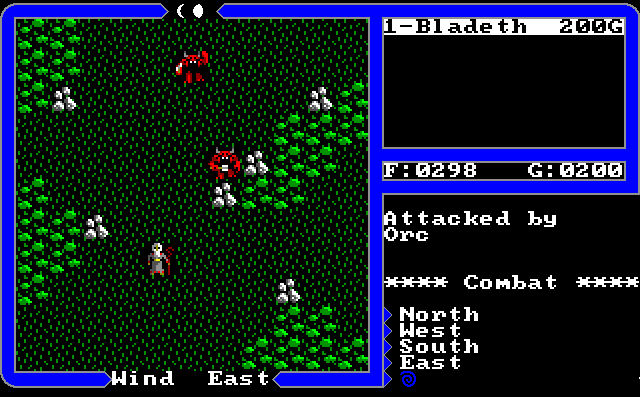Culture
Playing “Ultima 4” in 2012 (Pt. 2)

In an attempt to chart the ways in which video games have been dumbed down over the past few decades of evolution, Tom Harrison decided to play through Ultima 4: The Quest of the Avatar. What he unearthed was a hodgepodge of archaic languages and humbling confusion. This is his story. Part one can be found in the sidebar to your right.
Ultima 4: Where Video Games Meet Homework
Playing a game like this is like a goddamn research paper. So much of the gameplay takes place outside of the game itself. To be fair, it adds a sense of accomplishment when things click—i.e. I deciphered these bullshit codices and did a good!—and the manuals are charmingly written in-character, but one gets the feeling that in-game maps, journals, lore, crafting recipes, etc. aren’t simply the crutches of the casual gamer, but things developers have made standard for a reason: they work. Ultima 4 defies explanation in its indifference to the player’s mental health.
How can anyone look at a game like this and not see dozens of ways to make quick, simple clarifications? Even the staunchest retro gamer should recognize that user-unfriendliness itself doesn’t make games any purer. Be honest: is Ultima 4 any better for having “seek Nostro!” really mean “find the one tile of wall that looks exactly the same as the rest but is actually a secret opening that leads to this guy you’ve never heard of before who knows where the rune you’re looking for is”? THE ANSWER’S NO.
It often feels like playing a video game made by people who had never seen a video game before. The reason may lie in the game’s age—at that point, no one had seen a video game of this scope. That said, Ultima 4 deserves every accolade it gets, earning them with an atmosphere so shockingly mature and thoughtful that modern games should hang their heads in shame for falling so far below a standard set when the medium was still pooping in diapers.
Why It’s Actually Great
Let me explain. Unlike nearly every RPG (including the first three Ultimas), there is no antagonist in Ultima 4. Previous adventurers have already driven the big, bad, evil forces out of the land. The object of the game is not to save the world, as it is no longer in need of saving. The object is to become an Avatar, a paragon of virtue and wisdom whose pure heart will be like unto a beacon lighting the path of righteousness for the peasantry so unused to peace and unsure of what constitutes a life well led. By comparison, in Dishonored, someone stabs a lady you like and tells people you did it. So you gotsta stab them back.
Real talk, you go around being honest and just and humble and shit, giving money to the poor, donating blood to the sick, finding mystical runes and mantras and using them to meditate about the nature of goodness, and that’s the game. It’s bonkers. Games with morality in them today generally give the player a super-good choice and a super-evil choice, and the consequences manifest in what powers you get, how people treat you or if someone dies in the end.Mostly, it’s a pointless cosmetic choice that doesn’t affect gameplay.
In Ultima 4, morality is the core mechanic of much of the game, and it’s not even a choice, per se. You have to actively seek beggars to give them gold, you have to—unprompted—pay what you owe to blind merchants who wouldn’t know better, you have to answer humbly when asked questions. These aren’t choices where you are shown the good-guy option and bad-guy option, but situations where you create the good-guy option yourself.
The Ending Part Where It All Wraps Up And I Connect Ultima 4 To Modern Gaming Like a Champ
It’s so refreshing to see a game about being a true bro just for the sake of being nice and helping out. What a change of pace to see a thoughtful, mature game less focused on grit and violence, and more about how not being a dick is something worth desiring in itself. How fucking sad is it, then, that this nearly 30-year-old game is “refreshing” and a “change of pace”? By all means it should be totally standard, its innovation worn down to cliché through years of imitation, Seinfeld-style. Why is “kill the bad guy” still the standard plotline of video games instead of “live through an interesting situation?”
The stock answer is because combat’s too fun and too popular to give up, but Ultima 4 doesn’t want for combat. The combat sucks, yes, because the game’s mechanics are shit and awful, but it isn’t as if action was removed in favor of shoe tying. Much of the late game is still standard-issue RPG fetch quests and dungeon crawling—and don’t get me started on how much the dungeon system sucks. (Seriously, don’t, because I will write 3,000 words about it.) It’s all here, and yet it’s still a game where the Climactic Final Event is reading a particularly enlightening book.
This kind of shit is why it’s infuriating to love video games. In an era where gameplay mechanics were thrown together out of spit and twigs and the player is expected to read goddamn Jane Eyre before knowing how to play the game, they got it so shockingly right. Now, when gameplay can be thrilling, fluid, and intuitive, and talented writers are constantly cranking out fascinating game worlds and engaging characters, something half as ruminative or unconventional as Ultima 4 would be hailed a goddamn monumental achievement that would blow the gaming community’s brains. I haven’t read much Middle English, but I’ve played Ultima 4. This is probably where I should write a pithy closer about how the Canterbury Tales are hard to read but still really good, but that’s hard and I think I’ve earned a break.